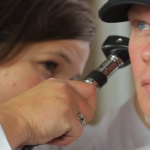How Many 3-Month DOT Medical Cards Can You Have?
TL;DR: Key Facts About 3-Month DOT Medical Card Limits
-
- Official Limit: No specific number, but multiple cards strongly discouraged
- Typical Pattern: One 3-month card followed by longer certification
- Medical Examiner Discretion: Can deny further temporary cards without improvement
- Common Reasons: High blood pressure, diabetes control, sleep apnea compliance
- Goal: Improve health to qualify for 1-year or 2-year certification
- Risk: Continued temporary cards may lead to disqualification
- Charlotte Solution: Charlotte DOT Exam Center helps drivers achieve longer certifications
- Call: 704-544-3494 for health improvement guidance
Drivers in Charlotte often receive temporary 3-month DOT medical cards when they have conditions needing closer follow-up. But how many times can you be issued one? Understanding the limits and expectations around temporary certifications is crucial for maintaining your commercial driving career.
Why 3-Month DOT Cards Are Issued
Temporary 3-month certifications serve as a bridge between disqualification and full certification, allowing drivers time to address health concerns while maintaining their ability to work. The FMCSA Medical Examiner Handbook explains that temporary cards are intended to allow time for treatment, not indefinite renewal.
High Blood Pressure: The Leading Cause
High blood pressure accounts for approximately 40% of temporary certifications in Charlotte. Drivers with Stage 2 hypertension (160-179/100-109) receive 3-month cards while working to reduce their readings below 140/90.
Why Blood Pressure Triggers Temporary Cards:
- Immediate readings exceed safe thresholds
- Medication needs time to take effect
- Lifestyle changes require adjustment period
- Multiple medications may need testing
- Side effects must be monitored
Charlotte drivers facing blood pressure challenges often struggle with:
- Stress from traffic on I-77 and I-485
- Irregular eating schedules affecting medication timing
- Limited exercise opportunities during long shifts
- High-sodium meals at truck stops
- Sleep disruption affecting blood pressure
For comprehensive information about managing blood pressure for DOT certification, visit our guide on DOT exam and blood pressure requirements .
Diabetes Control Issues
Diabetes control issues represent the second most common reason for temporary certification. Drivers with A1C levels between 8-10% or those transitioning to insulin therapy typically receive 3-month cards.
Diabetes-Related Temporary Certifications:
- Recently diagnosed diabetes requiring stabilization
- A1C above 8% but showing improvement
- Insulin therapy adjustment period
- Hypoglycemic episode recovery
- Medication changes affecting control
The FMCSA’s diabetes standards require demonstrated stable control before longer certification. Drivers must show:
- Consistent blood sugar logs
- Absence of severe hypoglycemia
- A1C trending downward
- Medication compliance
- Regular medical monitoring
Learn more about diabetes requirements in our detailed guide to DOT physical A1C requirements for diabetes .
Vision Concerns
Vision concerns requiring temporary certification include:
- Borderline visual acuity (near 20/40 threshold)
- Recent corrective lens prescription changes
- Scheduled cataract surgery
- Progressive conditions requiring monitoring
- Monocular vision adaptation
Charlotte’s aging driver population increasingly faces vision challenges:
- Cataracts affecting night driving
- Diabetic retinopathy complications
- Glaucoma requiring treatment
- Macular degeneration monitoring
- Post-surgical recovery periods
Temporary certification allows time for:
- Vision correction stabilization
- Surgical intervention and recovery
- Adaptation to new prescriptions
- Specialist evaluation completion
- Progressive condition assessment
Sleep Apnea Non-Compliance
Sleep apnea non-compliance triggers temporary cards when drivers:
- Recently diagnosed, starting CPAP therapy
- Show inadequate usage data (below 70% compliance)
- Experience equipment problems
- Undergo alternative treatment trials
- Require pressure adjustments
Charlotte drivers face unique sleep apnea challenges:
- Difficulty using CPAP in trucks without APU units
- Inconsistent power access at rest stops
- Equipment maintenance while on the road
- Insurance coverage delays for equipment
- Finding sleep specialists accepting CDL patients
The goal during temporary certification is achieving:
- Minimum 70% usage rate
- Average 4+ hours nightly use
- Documented compliance reports
- Reduced daytime sleepiness
- Stable treatment routine
FMCSA Rules on Repeat Temporary Cards
The Federal Motor Carrier Safety Administration provides medical examiners with discretion regarding temporary certifications, but establishes clear expectations about their purpose and duration.
One 3-Month Card is Typically Allowed
One 3-month card is allowed as standard practice for conditions expected to improve with treatment. This initial temporary certification provides:
- Time for medication to take effect
- Opportunity to implement lifestyle changes
- Period for specialist consultation
- Window for diagnostic testing
- Chance to demonstrate compliance
Medical examiners expect measurable improvement after the first 3-month period. Drivers should show:
- Blood pressure reduction (even if not yet below 140/90)
- A1C decrease (moving toward 8% or below)
- CPAP compliance improvement
- Weight loss progress
- Medication adherence
Multiple Back-to-Back Cards Are Discouraged
Multiple back-to-back 3-month cards are discouraged by FMCSA guidance. While no absolute limit exists, examiners scrutinize requests for additional temporary certifications.
Red Flags for Examiners:
- No improvement in measurable metrics
- Non-compliance with treatment
- Missed medical appointments
- Failure to fill prescriptions
- Continued poor lifestyle choices
Acceptable Reasons for Second Card:
- Documented improvement trending correctly
- Medication adjustment still ongoing
- Specialist appointment delays beyond driver’s control
- Insurance authorization pending for treatment
- Significant progress with more time needed
After two consecutive 3-month cards, examiners typically require:
- Specialist clearance letters
- Detailed treatment documentation
- Clear improvement trajectory
- Specific timeline for resolution
- Evidence of maximum effort
Medical Conditions Must Improve
Medical conditions must improve to qualify for a 1-year or 2-year card. The FMCSA views temporary certification as a pathway to longer certification, not a permanent solution.
Expected Improvement Timelines:
- Blood Pressure: Should reach below 140/90 within 3-6 months
- Diabetes: A1C should drop below 9% within 3 months, below 8% within 6 months
- Sleep Apnea: Compliance achieved within 30-90 days
- Weight Loss: 5-10% reduction within 3 months
- Vision: Correction or surgery completed within 3-6 months
Failure to improve suggests:
- Underlying conditions requiring investigation
- Treatment non-compliance
- Need for specialist referral
- Potential unsuitability for commercial driving
- Risk of eventual disqualification
Conditions That Trigger Repeat Reviews

Certain medical conditions are more likely to result in multiple temporary certifications, requiring drivers to understand the expectations and work actively toward improvement.
Chronic Hypertension
Chronic hypertension often requires multiple temporary cards when:
- Multiple medications need testing
- Resistant hypertension requires specialist care
- White coat syndrome complicates readings
- Secondary causes need investigation
- Lifestyle changes take time to impact
Charlotte drivers with chronic hypertension should:
- Monitor blood pressure daily at home
- Keep detailed logs for examiner review
- Work with cardiologist or nephrologist
- Address underlying causes (sleep apnea, kidney disease)
- Consider 24-hour ambulatory monitoring
Strategies for Breaking the Cycle:
- Medication optimization with physician
- DASH diet implementation
- Weight loss program participation
- Stress management techniques
- Regular exercise routine establishment
Poorly Controlled Diabetes
Poorly controlled diabetes leading to repeat temporary cards indicates:
- Insulin resistance requiring adjustment
- Diet non-compliance
- Irregular medication timing
- Complications affecting control
- Need for continuous glucose monitoring
Drivers stuck in temporary certification cycles should:
- See endocrinologist specializing in diabetes
- Consider insulin pump therapy
- Implement continuous glucose monitoring
- Address dawn phenomenon issues
- Evaluate for diabetic gastroparesis
Breaking Through to Longer Certification:
- Achieve A1C below 8% consistently
- Demonstrate 3 months stable control
- Document absence of severe hypoglycemia
- Maintain detailed glucose logs
- Get specialist support letter
Untreated Sleep Apnea
Untreated sleep apnea resulting in multiple temporary cards suggests:
- CPAP intolerance requiring alternatives
- Inadequate pressure settings
- Mask fit problems
- Central or complex apnea
- Need for surgical intervention
Charlotte resources for breaking the cycle:
- Novant Health Sleep Centers
- Atrium Health Sleep Medicine
- CPAP supply companies with CDL driver programs
- Oral appliance specialists
- Surgical consultations for apnea
Alternative Treatments to Consider:
- Oral appliances for mild-moderate apnea
- Inspire hypoglossal nerve stimulator
- Upper airway surgery
- Weight loss surgery for severe obesity
- Positional therapy devices
How to Move from 3-Month to 1-Year or 2-Year Card
Breaking free from the temporary certification cycle requires strategic action and commitment to health improvement. Charlotte DOT Exam Center helps drivers develop personalized plans for achieving longer certifications.
Improve Health Metrics with Medical Care
Improve health metrics with medical care through comprehensive approach:
Find the Right Healthcare Team:
- Primary care physician understanding CDL requirements
- Specialists familiar with DOT standards
- Pharmacist for medication optimization
- Nutritionist for dietary planning
- Mental health support for stress management
Charlotte Medical Resources:
- Novant Health occupational medicine
- Atrium Health specialized clinics
- Charlotte Community Health Clinic for uninsured
- Prescription assistance programs
- Diabetes education centers
Optimize Treatment Plans:
- Regular appointment scheduling
- Medication adherence strategies
- Blood work monitoring
- Specialist coordination
- Treatment documentation
Re-Test at Charlotte DOT Exam Center
Re-test at Charlotte DOT Exam Center when metrics improve:
Strategic Timing for Re-Examination:
- Blood pressure stable for 2+ weeks
- A1C showing downward trend
- 30+ days CPAP compliance achieved
- Weight loss goal reached
- Specialist clearance obtained
Preparation for Successful Recertification:
- Two Weeks Before:
- Verify all metrics meet standards
- Gather medical documentation
- Schedule early morning appointment
- Review medication list
- One Week Before:
- Avoid sodium and alcohol
- Maintain consistent sleep schedule
- Continue medication routine
- Reduce stress activities
- Day of Exam:
- Arrive rested and relaxed
- Bring all documentation
- Take medications as normal
- Avoid caffeine before BP check
Call 704-544-3494 to discuss optimal timing for your re-examination at Charlotte DOT exam and CDL medical certification center.
Maintain Treatment Compliance
Maintain treatment compliance between certifications:
Documentation Strategies:
- Keep detailed health logs
- Save pharmacy receipts
- Document specialist visits
- Track improvement metrics
- Maintain equipment reports
Technology Tools:
- Blood pressure monitoring apps
- Glucose tracking applications
- CPAP compliance downloads
- Medication reminder systems
- Telehealth appointments
Accountability Systems:
- Regular check-ins with Charlotte DOT Exam Center
- Monthly progress evaluations
- Support group participation
- Family involvement in health goals
- Employer wellness programs
Charlotte Example: From Temporary to Long-Term Certification
A driver in Ballantyne with hypertension improved after treatment and qualified for a 1-year card on re-exam. This real-world success story illustrates the path from temporary to longer certification.
The Initial Challenge
Driver Profile:
- Age 52, Class A CDL holder
- 15 years driving experience
- Regional routes from Charlotte
- Initial BP: 168/102
- BMI: 34
First Examination:
- Issued 3-month temporary card
- Prescribed blood pressure medication
- Referred to cardiologist
- Advised lifestyle changes
- Scheduled follow-up
The Improvement Journey
Month 1 Actions:
- Started lisinopril 10mg daily
- Eliminated fast food meals
- Began walking 30 minutes daily
- Reduced sodium to 2,000mg
- Home BP monitoring twice daily
Month 2 Progress:
- BP averaging 148/92
- Lost 8 pounds
- Medication increased to 20mg
- Added HCTZ for better control
- Joined Ballantyne YMCA
Month 3 Results:
- BP stable at 136/88
- Total weight loss: 15 pounds
- Consistent medication compliance
- Cardiologist clearance letter
- Improved energy and sleep
The Successful Recertification
Re-Examination at Charlotte DOT Exam Center:
- BP reading: 134/86
- All other metrics normal
- Documentation complete
- Qualified for 1-year certification
- Avoided further temporary cards
Key Success Factors:
- Early aggressive treatment
- Consistent monitoring
- Lifestyle commitment
- Medical team coordination
- Strategic timing of re-exam
This Ballantyne driver’s success demonstrates that escaping the temporary certification cycle is achievable with proper medical care and commitment to health improvement.
Frequently Asked Questions
How many 3-month DOT medical cards can you have in NC?
Usually one, unless under medical supervision. While no absolute limit exists in North Carolina or federal regulations, medical examiners typically:
- Issue one 3-month card for initial treatment
- May allow second if clear improvement shown
- Rarely approve third without specialist involvement
- Eventually require disqualification without progress
The key phrase is “medical supervision” – drivers working closely with physicians and showing documented improvement may receive additional temporary cards, but this requires:
- Specialist letters supporting continued certification
- Clear improvement trajectory
- Specific treatment plans
- Reasonable timeline for resolution
What does a 3-month DOT card mean?
It is a temporary clearance indicating:
- Medical condition needs monitoring
- Treatment recently started
- Improvement expected with time
- Not yet meeting full certification standards
- Conditional approval to continue driving
A 3-month card is NOT:
- A permanent solution
- Indefinitely renewable
- Indication of fitness without improvement
- Guarantee of future certification
- Excuse to delay treatment
Drivers should view temporary certification as opportunity to:
- Address health issues aggressively
- Demonstrate treatment compliance
- Work toward longer certification
- Maintain employment while improving
- Avoid disqualification
Can you keep driving with a temporary DOT card?
Yes, but only until it expires. A valid 3-month DOT medical card provides full commercial driving privileges identical to longer certifications:
- Legal for all CMV operation
- Valid for interstate commerce
- Accepted at weigh stations
- Satisfies employer requirements
- Maintains CDL status
However, drivers must understand:
- No grace period upon expiration
- Must renew before expiration date
- May not receive another temporary card
- Improvement expected at renewal
- Risk of disqualification without progress
What happens if I don’t improve after a 3-month card?
If health metrics don’t improve:
- Medical examiner may deny recertification
- Disqualification from commercial driving
- CDL downgrade to regular license
- Loss of employment
- Need to requalify once health improves
Options if facing disqualification:
- Seek second opinion from another certified examiner
- Request specialist evaluation
- Apply for FMCSA exemption (limited conditions)
- Focus on aggressive treatment
- Consider career transition planning
Can different examiners have different standards for temporary cards?
While FMCSA provides guidelines, certified medical examiners have discretion in:
- Interpreting borderline results
- Evaluating improvement adequacy
- Determining certification periods
- Requiring additional documentation
- Assessing overall fitness
This is why choosing an experienced examiner at Charlotte DOT Exam Center matters – consistency and understanding of driver needs while maintaining safety standards.
How can I avoid getting stuck in 3-month card cycles?
Strategies to break the cycle:
- Address root causes, not just symptoms
- Work with specialists familiar with DOT requirements
- Document everything related to treatment
- Time recertification strategically when metrics are best
- Maintain improvements between examinations
- Consider alternative treatments if current approach isn’t working
- Get professional guidance from Charlotte DOT Exam Center
Take Control of Your Certification Future
Don’t let temporary 3-month cards become a permanent pattern. Charlotte DOT Exam Center helps drivers achieve longer certifications through strategic health management and expert guidance.
Charlotte DOT Exam Center 8415 Pineville-Matthews Road, Suite 102 Charlotte, NC 28226
Call 704-544-3494 to:
- Discuss your temporary certification status
- Develop improvement strategies
- Plan optimal recertification timing
- Get health management resources
- Break free from 3-month cycles
Why Choose Charlotte DOT Exam Center for Certification Management?
- Experience with Temporary Certifications: Understanding of improvement timelines
- Strategic Guidance: Helping drivers achieve longer certifications
- Medical Network: Referrals to CDL-friendly specialists
- Progress Monitoring: Track improvements between exams
- Flexible Scheduling: Accommodate treatment schedules
Related Resources
- CDL Medical Exam and DOT Card Services in Charlotte NC
- DOT Exam and Blood Pressure
- DOT Physical A1C Requirements for Diabetes
- Sleep Apnea DOT Physical Requirements
- Preparing for Your DOT Medical Exam
Charlotte DOT Exam Center – Your partner in achieving long-term DOT medical certification. We help Charlotte drivers move from temporary to permanent certification through expert guidance and comprehensive support. Break the 3-month cycle and secure your driving future.

I am the administrator for the Charlotte DOT Exam facility, located in Charlotte NC. I oversee the facility services providing DOT exams in accordance with the standards of the FMCSA. We also provide DOT drug testing with MRO support when required. Drug testing can also be done for non-DOT exams such as pre-employment. In order to minimize wait times, I always encourage our clients to contact us first and make an appointment.
I would also suggest that each individual wanting to test for the CDL health card read the article “Preparing For Your DOT Exam” as it lists several things to bring to the test, such as CPAP usage reports and medicine lists.


